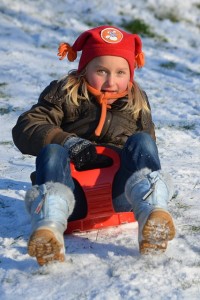Winter Safety Tips for Kids
Though it can sometimes be very cold and nasty, depending on where you live, winter can offer you and your family a variety of fun outdoor activities and experiences that rival those of the summer months. From snowball fights to snowboarding and skiing trips, no matter what you plan for, as we head into the short days and cold temperatures of the winter months, keep these winter safety tips for kids in mind and ensure that you and your family have a fun and healthy winter experience.
1. Keep Warm!
The first winter safety tip for kids seems obvious. Making sure that you and your kids are warm during winter activities is instinctual. But there are a number of ways to dress properly for winter weather that have to be learned.
It is important that you layer your child’s winter clothing. Layers provide more efficient insulation than just one bulky coat and can easily be removed and added to suit the temperature.
Frostbite is one of the most common winter freezing injuries. Frostbite is most frequently seen on bodily extremities and exposed skin. If not properly protected, your child’s fingers, toes, nose, ears, and cheeks can become numb, pale, gray or bluish in color. This discoloration is the first sign of frostbite. The American Academy of Pediatrics recommends that you apply warm water – not hot – to any suspected frostbite areas (around 104 degrees). If the numbness and blisters persist, call your child’s doctor immediately.
Another winter condition resulting from exposure to cold air is hypothermia. Hypothermia is when the body temperature of your child drops below normal levels, usually as a result of prolonged outdoor activity in freezing temperature. This condition can occur more quickly in children than adult, so it’s important to keep a lookout for it.
Common hypothermia symptoms include shivering, lethargy, clumsiness and loss of motor control, slurred speech and confusion. If you suspect your child is hypothermic, call 911 and take them inside.
In order to prevent hypothermia, set reasonable limits on outdoor play in cold conditions.
2. Winter Activity Safety
While it is important to keep warm during the winter months, that is not the end of the story. Many of the activities that both kids and adults enjoy are hazardous in their own way. These quick winter safety tips for kids and adults will help make your winter activities with you family safe and fun.
When sledding, skiing or snowboarding it is important to inform your child about how to keep as safe as possible and avoid injury.
All children should be supervised while sledding. It is recommended that children use steerable sleds, not tubes or disks, and that they be prevented from sledding in a head first position.
Skiing and snowboarding should be taught to your children by a qualified instructor in a kids program.
Never ski, sled or snowboard alone. Make sure you child has a buddy or is properly supervised.
When ice skating, make sure that the ice has been approved as safe before letting your child venture out. Never go out on ice that you are unsure of.
3. Health
Winter is known as the flu season because, according to statistics, that is when most flu infections occur. However, cold weather is not the cause of the flu. There do happen to be more flu viruses during the cold months, but the primary reason for infection is because we stay indoors longer and are exposed to other people’s germs more frequently than in the summer months. The best way to prevent the flu from spreading is to teach your kids the importance of frequent handwashing.
Another, often overlooked, winter safety tip for kids is the need to ensure proper protection from the sun. Snow and ice reflects sunlight and can easily cause sunburn on exposed skin in a short period of time. Make sure your child is properly protected from the sun’s rays.
Winter Safety at Noah’s Ark Childcare
Noah’s Ark Childcare Center is devoted to the safety of your child no matter the weather. Whether it is snow, sleet, ice, rain or a exceptionally hot day, the staff at Noah’s Ark are trained to spot the signs of possible safety and health issues resulting from weather. Contact us today for more info on our safety training and experience. We look forward to hearing from you!

